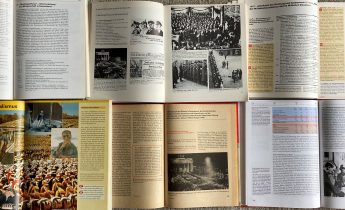Personal Details: Bernhardt, Markus
Guest Author
Core Author | Stammautor 2013-2016
Markus Bernhardt, Dr. phil. (*1959), ist Professor für Didaktik der Geschichte an der Universität Duisburg-Essen. Er war nach Studium und Promotion an der Universität Gießen elf Jahre im Schuldienst tätig (Unterricht in den Fächern Geschichte und Latein an Gesamtschule und Gymnasium in Braunschweig und Wolfenbüttel). 2002-2007 wiss. Assistent an der Universität Kassel (2007 venia legendi). 2008-2011 Professor an der PH Freiburg. Seine fachwiss. Forschungsschwerpunkte liegen in der Geschichte des Kaiserreichs von 1871, der neueren deutschen Rechtsgeschichte und der deutschen Geschichte nach 1945. Im Bereich der Fachdidaktik führt er empirische Forschungen zum Kompetenzerwerb und zur Metakognition im Geschichtsunterricht durch und geht der Struktur und Rezeption von populären Geschichtsdarstellungen nach.
Markus Bernhardt, PhD (*1959), is Professor for History Didactics at the University of Duisburg/Essen. He studied History and Latin at the University of Giessen. After that he was school teacher in Brunswick and Wolfenbüttel for eleven years. 2002-2007 research associate at the University of Kassel (2007 venia legendi). 2008-2011 professor for history didactics at the university of education in Freiburg/Br. His emphasis of historical research is placed on the history oft the German Empire (1871-1918), the younger german history of law and the history of Germany after 1945. His didactical research topics are empirical studies on competencies and metacognition in history education. In the field of history culture he analyses structure and reception of popular history.
http://www.uni-due.de/geschichte/personal.php?SHOW=one&ID=207-
Game of Thrones and Leviathan
Game of Thrones and Leviathan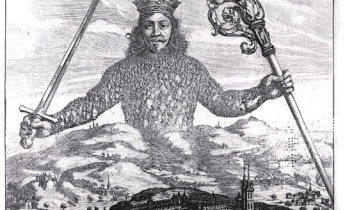
"Game of Thrones" is set somewhere in the Middle Ages. The plot, characters and places are fictional. On the Island of Westeros, which resembles Europe and is the main setting of the story... / "Game of Thrones" spielt irgendwie im Mittelalter. Die Handlung, die Personen und Orte sind fiktiv. Auf der Europa ähnlichen Insel Westeros...
-
Back to Nationalism. No Future for History?
Zurück zum Nationalismus. Keine Zukunft für die Geschichte?
Back to Nationalism. No Future for History?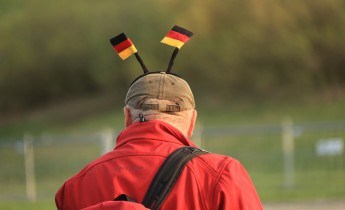
Currently, throughout Europe, various forms of nationalism are sprouting, as if decades of peaceful European cooperation had never existed. History education is looking on helplessly. Instead of providing students with the ability to orient to a future that is historically undefined...
-
Bilingual History classes (CLIL) – no, thanks!
Bilingualer Geschichtsunterricht – Nein Danke!
Bilingual History classes (CLIL) – no, thanks!
The North Rhine-Westphalia (NRW) education portal grandiosely states: "Bilingual teaching is a formula for success. The DESI (Deutsch-Englisch Schülerleistungen International) study commissioned by the Conference of German Education Ministers, projects at different schools,
-
“Mandatory attendance, farewell!”
„Adieu, Anwesenheitspflicht“
“Mandatory attendance, farewell!”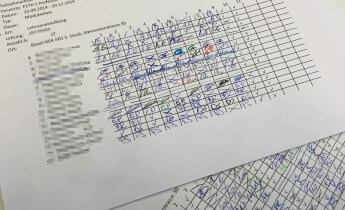
Recently, the ASTA (German Students' Union) of the University of Duisburg-Essen ran a front-page headline, reading "Mandatory attendance, farewell!" ("Adieu, Anwesenheitspflicht"). If one believes ASTA representatives, their victory bears comparison with the enforcement of the Rights of Man and of the Citizen during the French Revolution.
-
Die Lehnspyramide – ein Wiedergänger des Geschichtsunterrichts
Die Lehnspyramide – ein Wiedergänger des Geschichtsunterrichts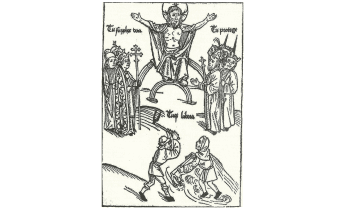
Abstract: Der 1998 verstorbene Mediävist Hartmut Boockmann hat 1992 in der GWU einen Topos der Mittelalterdarstellungen in den Schulbüchern dekonstruiert: die Lehnspyramide. Seine Kritik richtete sich gegen die zahlreichen... Read More ›
-
Der „späte Sieg der Diktaturen“ – Resultat ergebnisoffenen Unterrichts?
Der „späte Sieg der Diktaturen“ – Resultat ergebnisoffenen Unterrichts?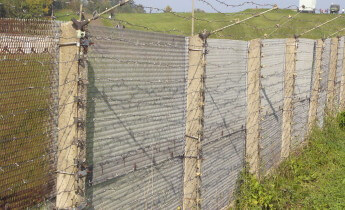
Abstract: „Surely a grade of 33 in 100 on the simplest and most obvious facts of American history is not a record in which any high school can take... Read More ›
-
Erinnerungsorte, Eintracht Braunschweig und der Geschichtsunterricht
Erinnerungsorte, Eintracht Braunschweig und der Geschichtsunterricht
Abstract: Es gibt ein Datum in der Historie, das im niedersächsischen Braunschweig fast jeder zuordnen kann: das Jahr 1967. Es ist das Jahr, als die Fußballer des Braunschweiger Turn-... Read More ›
